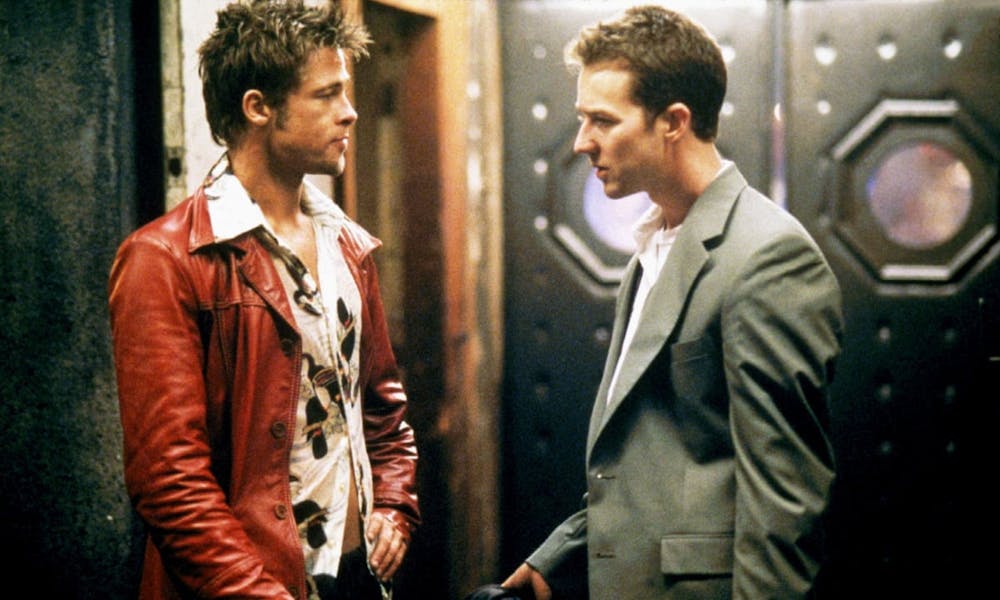“The first rule of Fight Club is you do not talk about Fight Club.” In contrast to Tyler Durden’s cautionary words, talking about “Fight Club” seems to be all that everyone has been able to do since its release in 1999. Despite mixing satire, anarchy and male fragility into one chaotic cocktail, the peculiar film’s initial box office reception was lukewarm. However, it has since become a cultural juggernaut, with its universal themes reverberating throughout the historical corridors of popular culture. Now, 25 years later, “Fight Club” is both a time capsule of the anxieties of the 90s and a mirror reflecting our present-day struggles with abstract concepts such as identity, consumerism and belonging.
At its core, “Fight Club” is emblematic of disillusionment in a consumer-driven society, something that still holds true today. With an audience teetering on the brink of the digital age, Tyler Durden’s magnetic declaration that “the things you own end up owning you” resonated deeply, especially considering how the internet was beginning to weave itself into the fabric of everyday life at this time. For many, the film highlighted the necessity of an unspoken rebellion against the creeping monotony of modernity.
Fast forward to 2024, this declaration still feels prophetic. The rise of social media has merely amplified the pressures of consumerism. Tyler Durden’s disdain for perfect living spaces mirrors the toxic and disillusionment-creating notion that one must only display perfected facades of their lives online. The fractured sense of self that plagues many of the miserable characters feels eerily familiar to our age of identity crises fueled by online facades and personas.
Perhaps the film’s most enduring — and most critiqued — legacy is its portrayal of masculinity in a way considered unorthodox at the time. In 1999, “Fight Club” tapped into the hidden feelings of alienation among men in a time marked by societal shifts that left many struggling with their purpose. The fight clubs portrayed in the movies proved to be sanctuaries where men could reclaim their primal, dominant sense of self, albeit through destructive means.
The questions raised by “Fight Club” regarding toxic masculinity have not waned in relevance today. With the rise of “alpha-male” influencers, podcasts affirming destructive ideals for men and the emphasis on nine-to-five jobs, it is apparent that many of the issues in “Fight Club” have not disappeared but evolved. Through this lens, rewatching the film in 2024 invites a fresh critique: is Tyler Durden truly a savior, or is he just another exploitative man cloaked in false charisma?
What is truly captivating about this film is its universality and the ability of its message to be applied to a plethora of times and places. On one hand, it is a testament to the necessity of rebellion; on the other, it appears as a cautionary tale about losing yourself by going too far. The striking visuals andiconic lines have cemented its place in popular culture, and its critiques of capitalism have kept it relevant through the years.
It is worth noting that “Fight Club” has turned into somewhat of a litmus test for how we interpret art as well. The infamous “first rule” has now become a line quoted and recognized by many, and the film’s deeper meanings often get lost amidst the extravaganza of its scenes. This duality between surface appeal and allegorical commentary is part of its magnetic quality.
25 years later, “Fight Club” is more than a film. It is a phenomenon that continues to provoke, motivate and defy. Its anniversary gives us the opportunity to reflect not only on its impact but also our progress — or lack thereof — in addressing its main critiques of our society.
As we celebrate its quarter-century of life, I admit that there is one rule of “Fight Club” that I would change: we should talk about “Fight Club”, because now more than ever, its ideas deserve a seat at our table.
Get The Chronicle straight to your inbox
Sign up for our weekly newsletter. Cancel at any time.
Jenna Arafeh is a Trinity first-year and a staff writer for Recess.

